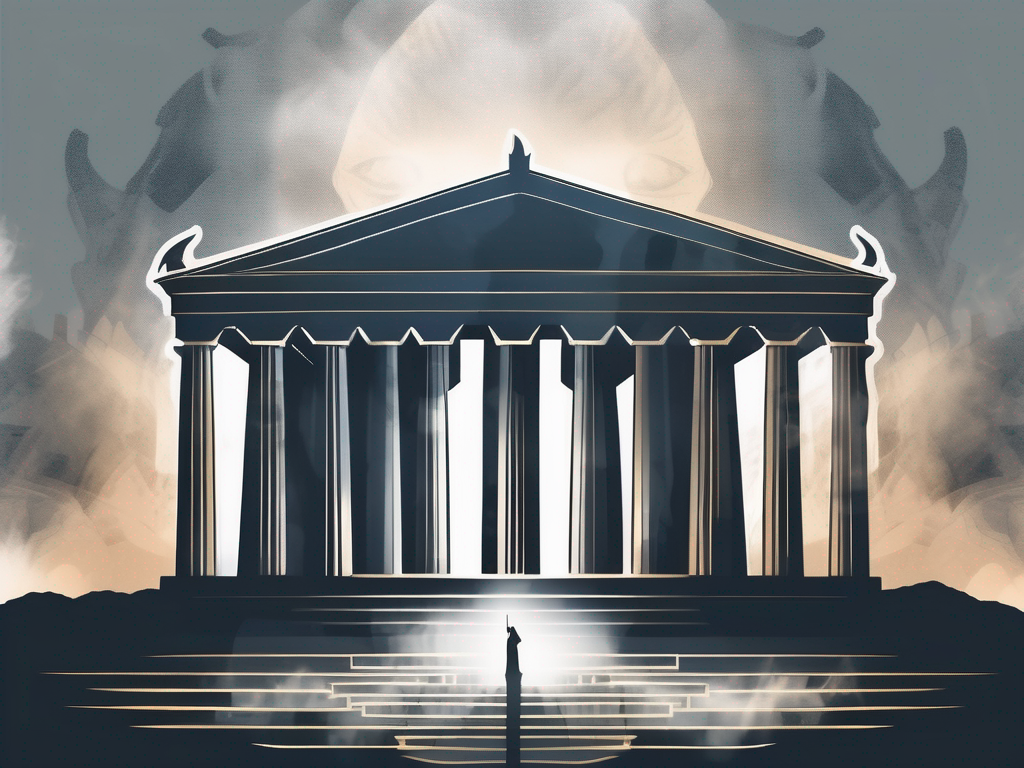In Greek mythology, there exists a realm of gods and goddesses, each with their own unique powers and stories. Among these divine beings, there is one that stands out as particularly enigmatic – the Primordial Greek God. This deity holds a mysterious and influential place in ancient Greek culture, leaving scholars and enthusiasts alike eager to shed light on its origins and significance.
Understanding the Concept of Primordial Deities
Before delving deeper into the enigma of the Primordial Greek God, it is crucial to grasp the concept of primordial deities themselves. In Greek mythology, primordial gods are the very first beings to emerge from the chaos of creation. They personify fundamental elements of the universe, such as time, space, and nature. These deities lay the foundation for the subsequent generation of gods and goddesses who would come to rule the pantheon.
Imagine a vast expanse of nothingness, a void devoid of any form or structure. From this formless chaos, the primordial deities emerged, bringing order and purpose to the universe. They are the embodiment of the primal forces that shape the cosmos, the architects of existence itself.
One of the most intriguing aspects of primordial deities is their abstract nature. Unlike other gods and goddesses, they do not possess human-like qualities or personalities. Instead, they represent concepts and phenomena that are beyond human comprehension. They are the personification of time, the embodiment of space, and the essence of nature. Their existence transcends the boundaries of mortal understanding, making them both mysterious and awe-inspiring.
The Role of Primordial Deities in Greek Mythology
Primordial deities, including the mysterious Primordial Greek God, played an essential role in Greek mythology. They were responsible for shaping the cosmos and establishing its essential principles. These gods embodied the primordial forces that governed the world, making their existence of paramount importance in the ancient Greek belief system.
Picture the primordial deities as the architects of the universe, meticulously crafting the very fabric of reality. They set the stage for the gods and goddesses who would come after them, laying the groundwork for the pantheon that would rule over mortals. Without the primordial deities, the world as the ancient Greeks knew it would not exist.
Each primordial deity had a specific domain and influence. For example, Chronos, the personification of time, governed the eternal flow of moments. Gaia, the embodiment of the Earth, nurtured and sustained all life. These deities were not mere characters in stories; they were the driving forces behind the natural order of the world.
The Distinction between Primordial and Other Greek Gods
While the distinction between primordial gods and other deities may seem subtle, it carries significant meaning. Unlike other gods and goddesses, the primordial divinities represent abstract concepts rather than human-like entities. They embody natural phenomena, embodying the very fabric of existence itself. This sets them apart and deepens the allure surrounding the Primordial Greek God in particular.
When we think of traditional Greek gods and goddesses, we often envision figures with human-like appearances and personalities. They possess human emotions, desires, and flaws. In contrast, the primordial deities transcend such human qualities. They are the embodiment of cosmic forces that shape the world but remain detached from mortal concerns.
The Primordial Greek God, whose identity remains shrouded in mystery, holds a special place among the pantheon of primordial deities. The enigma surrounding this deity sparks curiosity and fascination. Who is this god? What role did they play in the creation of the universe? These questions continue to intrigue scholars and mythologists, adding to the allure and mystique of the Primordial Greek God.
The Enigma of the Primordial Greek God
Despite countless myths and legends woven throughout Greek history, the Primordial Greek God remains shrouded in mystery. Its very existence sparks debate and captivates the imaginations of those seeking to unravel its secrets.
The Primordial Greek God, often referred to as the “First God,” is a figure that has fascinated scholars and historians for centuries. In ancient Greek mythology, this deity is believed to have existed before all other gods and goddesses, making it the ultimate source of power and creation. However, the lack of concrete information about this god has left many questions unanswered, leading to a multitude of theories and interpretations.
The Mystery Surrounding Their Existence
Perhaps the most intriguing aspect of the Primordial Greek God is the mystery surrounding its existence. With limited information passed down through ancient texts and artifacts, piecing together a complete account of this deity proves challenging. Curiosity continues to drive scholars to delve deeper into the depths of history in search of answers.
One theory suggests that the Primordial Greek God represents the primordial chaos from which the universe was born. This chaos, known as “Chaos” in Greek mythology, is said to have been the initial state of existence, from which all things emerged. It is believed that the Primordial Greek God embodies this chaotic energy, holding the power to shape and mold the world as we know it.
Another interpretation proposes that the Primordial Greek God is not a singular entity but rather a collective consciousness that encompasses all the gods and goddesses of the Greek pantheon. This theory suggests that the Primordial Greek God is the embodiment of the divine essence that flows through every deity, connecting them in a cosmic web of power and influence.
Interpretations of the Primordial Greek God
Throughout history, various interpretations have arisen regarding the nature and symbolism of the Primordial Greek God. Some scholars argue that this deity represents the fundamental principles of creation, while others attribute it to an all-encompassing, overarching power. Regardless of interpretation, the enigma surrounding this deity only grows more intriguing with each passing generation.
One prevalent interpretation posits that the Primordial Greek God is the personification of the four elements: earth, air, fire, and water. According to this theory, the god embodies the raw energies and forces that govern the natural world, making it the ultimate source of life and vitality. This interpretation aligns with the ancient Greek belief in the interconnectedness of all things, highlighting the god’s role as the unifying force behind the elements.
Another viewpoint suggests that the Primordial Greek God represents the concept of time itself. In this interpretation, the god is seen as the eternal entity that transcends the linear progression of time, existing in a realm beyond human comprehension. This theory emphasizes the god’s role as the keeper of cosmic order and the orchestrator of the cyclical patterns that govern the universe.
As the Primordial Greek God continues to elude definitive understanding, the allure of its enigmatic nature persists. Scholars and enthusiasts alike are drawn to the challenge of unraveling the secrets surrounding this ancient deity, piecing together fragments of information in an attempt to shed light on its true nature and significance.
The Influence of Primordial Greek Gods on Ancient Greek Culture
While the Primordial Greek God’s true nature may remain a mystery, its influence on ancient Greek culture is undeniable. From religion to art and literature, this enigmatic deity has left an indelible mark on the fabric of society.
The Impact on Ancient Greek Religion
Ancient Greek religion centered around the worship of various gods and goddesses, including the Primordial Greek God. As a core element of the pantheon, this deity shaped religious practices and mythological tales. Its presence permeated religious ceremonies, prayers, and sacrifices, reflecting the significance attributed to this mysterious figure.
The Influence on Greek Art and Literature
The influence of the Primordial Greek God extended beyond the realm of religious devotion. In ancient Greek art and literature, this deity served as a muse, inspiring artists and writers to create works that depicted the divine and explored the depths of human existence. From epic poems to awe-inspiring sculptures, the enigma of this deity breathed life into artistic expressions.
The Primordial Greek God in Modern Context
Though ancient Greek culture has long since faded, the enigmatic allure of the Primordial Greek God continues to persist in the modern world. Its presence can be felt in popular culture and contemporary interpretations, ensuring its relevance is not lost to time.
The Primordial Greek God in Popular Culture
From books to movies and television shows, the Primordial Greek God continues to captivate audiences in popular culture. Its mysterious persona often serves as a catalyst for thrilling adventures and deep introspection, resonating with modern audiences seeking a connection to the ancient past.
Modern Interpretations and Relevance of the Primordial Greek God
As our understanding of ancient Greek culture evolves, so do the interpretations and relevance of the Primordial Greek God. Contemporary thinkers and artists dissect its symbolism and explore its connections to our own existence. The enigma of this deity, once confined to the annals of history, has found new life in the ongoing conversations of today.
Unveiling the Enigmatic Primordial Greek God
In the realm of myth and legend, the Primordial Greek God stands as a testament to the enduring fascination with the unknown. Whether contemplating its role in ancient Greek culture, unraveling its enigmatic nature, or exploring its presence in popular culture, the allure of this deity persists. Each question answered leads to several more, ensuring that the mystery surrounding the Primordial Greek God endures across time and continues to captivate the human imagination.












